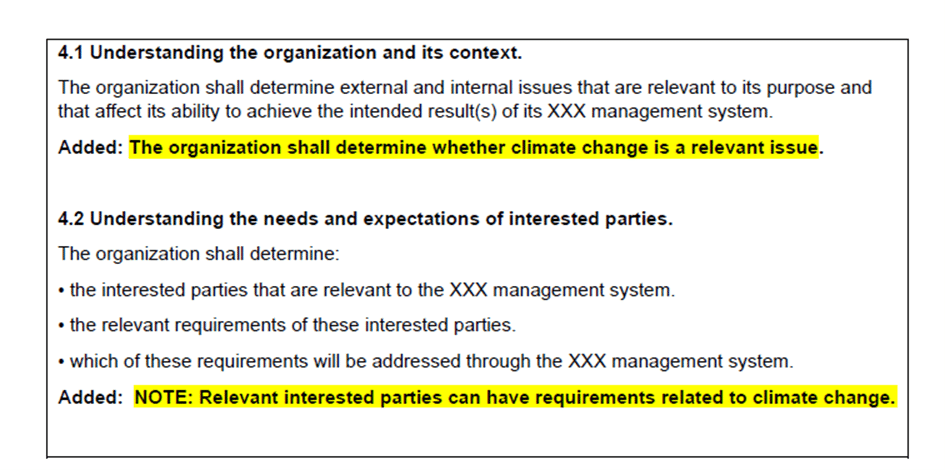AS9100 Climate Change Amendment
Effective Immediately
A new Amendment to AS9100 was recently published in 2024 and it impacts all companies that are currently AS9100, AS9120, and AS9110 certified as well as any certifications going forward.
The aerospace industry stands at the intersection of technological innovation and global sustainability efforts. As climate change continues to reshape our world, aerospace companies adhering to the AS9100 certification face a unique set of challenges and opportunities. With the introduction of the new climate change amendment, these companies must navigate a landscape of evolving regulations, market demands, and operational risks. In this article, we explore the implications of the climate change amendment on AS9100 certification and offer insights into how aerospace companies can adapt and thrive in this changing environment.
What are the New Climate Change Amendments for ISO Certification?
The new climate change amendments are one-line additions to ISO Management System Standards, Clauses 4.1 and 4.2.
Clause 4.1 is about understanding the organization and its context. The climate change addition to this clause is, “The organization shall determine whether climate change is a relevant issue.”
Clause 4.2 is about understanding the needs and expectations of interested parties. The climate change addition to this clause is, “NOTE: Relevant interested parties can have requirements related to climate change.”
What is the Intent of the Climate Change Requirements Added to Clauses 4.1 and 4.2?
“The overall intent of the requirements for clauses 4.1 and 4.2 remain unchanged; these clauses already include the need for the organization to consider all internal and external issues that can impact the effectiveness of their management system; these new inclusions are assuring that Climate Change is considered within the management system and that it is an external factor that is important enough for our community to require organizations to consider it now.” – ANAB Heads Up Issue: 527

What is the Climate Change Amendment?
According to the IAF/ISO (International Organization for Standardization) 22 February 2024 Joint Communiqué and Published on February 23, 2024, the Climate Action Amendment has been added to existing and new ISO Management Systems Standards (MSS) to reflect ISO’s Climate Action commitments.
“It is important that all parties understand the intent so that the changes can be consistently introduced and implemented.”
“In support of the ISO London Declaration on Climate Change, ISO passed a resolution that will result in two new statements of text being added to a number of existing management system standards and will be included in all new standards under development/revision, to address the need to consider the effect of Climate Change on the ability to achieve the intended results of the management system. The changes will be introduced initially as Amendments to these published standards.
The changes (two new statements) will be incorporated into the new text of the Harmonized Structure (Appendix 2 of the Annex SL in the ISO/IEC Directives Part 1 Consolidated ISO Supplement) as follows.”

From ANAB Heads Up Issue 527:
“FAQs from ANAB
What is the transition process because of the amendments?
The amendments are effective as of the date of publication and there is no transition for implementation because of the overall intent quoted above. See the IAF Final Decision for more details.
What is required of an applicant or certified organization?
As detailed in the IAF Final Decision, certified organizations (including applicants) need to consider if Climate Change is a relevant issue within their own management system(s). If so, as with other relevant issues, the organization must consider it within their system’s objectives and risk evaluation, within the scope of their management system(s).
See the IAF Final Decision for more details.
Does the amendment to the management system standard/s require a revision to the certification document?
No, a revised certificate is not required to be issued for the sole purpose of recognizing the amendment to the management system standard(s). Please refer to the IAF Final Decision, Timing section.”
See the IAF Final Decision for more details.
What Changes do Organizations that are Already AS9100 Certified need to make when it comes to the Climate Change Amendment?
While the specifics may vary based on the organization’s size, operations, and location, here are some general changes that AS9100 certified organizations may need to make to comply with the AS9100 climate change amendment:
Environmental Policy Review:
Organizations may need to review and potentially update their environmental policy to explicitly address climate change mitigation and adaptation goals. This could involve setting targets for reducing greenhouse gas emissions, improving energy efficiency, and minimizing environmental impact throughout the aerospace supply chain.

Risk Management Integration:
Climate change-related risks should be integrated into the organization’s risk management processes. This may include conducting risk assessments to identify climate-related threats such as extreme weather events, supply chain disruptions, and regulatory changes, and developing mitigation strategies to address these risks.
Training and Awareness:
Employees at all levels of the organization should receive training and awareness programs on the implications of climate change for the aerospace industry and the organization’s role in addressing these challenges. This could involve educating employees on energy-saving practices, waste reduction strategies, and the importance of environmental stewardship.
Supply Chain Engagement:
Organizations should engage with their supply chain partners to assess and address climate-related risks and opportunities. This may involve conducting supplier audits to evaluate environmental performance, collaborating on initiatives to reduce emissions and waste, and promoting sustainable practices throughout the supply chain.
Documentation and Reporting:
Organizations may need to update their documentation and reporting processes to ensure compliance with climate change-related requirements. This could include documenting carbon emissions, energy consumption, and other environmental metrics, as well as reporting on progress toward sustainability goals in accordance with AS9100 certification standards.
Continuous Improvement:
AS9100-certified organizations should adopt a culture of continuous improvement when it comes to climate change management. This involves regularly monitoring and reviewing environmental performance, identifying areas for improvement, and implementing corrective actions to achieve sustainability objectives.
External Communication:
Organizations should communicate their commitment to addressing climate change to external stakeholders, including customers, regulators, and the public. This could involve updating marketing materials, participating in industry initiatives, and transparently reporting on environmental performance to demonstrate accountability and build trust.
Overall, complying with the AS9100 climate change amendment requires AS9100 certified organizations to integrate climate change considerations into their quality management systems, from policy development to operational implementation. By proactively addressing climate-related risks and opportunities, these organizations can enhance their resilience, sustainability, and long-term competitiveness in the aerospace industry.

Examples of how Climate Change Issues May affect AS9100 Certified Companies
AS9100 is a quality management standard specifically for the aerospace industry. While the direct impacts of climate change on AS9100-certified companies may vary depending on their location, size, and specific operations, here are some general ways in which climate change could affect them:
Supply Chain Disruptions:
Climate change can lead to more frequent and severe weather events such as hurricanes, floods, and wildfires, which may disrupt the supply chain for aerospace components and materials. AS9100-certified companies rely on a complex network of suppliers, and disruptions in the supply chain can lead to delays in production and increased costs.
Regulatory Changes:
As governments around the world implement policies to mitigate climate change, there may be new regulations and standards that AS9100-certified companies need to comply with. This could include stricter emissions standards, requirements for energy efficiency, or regulations related to the use of certain materials in aerospace manufacturing.
Increased Energy Costs:
Climate change can lead to fluctuations in energy prices due to changes in supply and demand for fossil fuels. AS9100-certified companies, which often have energy-intensive manufacturing processes, may face higher energy costs as a result. Implementing energy-saving measures and investing in renewable energy sources can help mitigate this impact.
Physical Infrastructure Risks:
Aerospace manufacturing facilities and infrastructure may be vulnerable to extreme weather events and sea-level rise caused by climate change. AS9100-certified companies may need to invest in measures to protect their facilities from flooding, storm damage, and other climate-related risks.
Insurance Costs:
Climate change-related risks such as extreme weather events and natural disasters can increase insurance premiums for aerospace companies. AS9100-certified companies may need to reassess their insurance coverage and risk management strategies to account for these higher costs.
Market Demand Shifts:
As the impacts of climate change become more pronounced, there may be shifts in market demand for aerospace products and services. For example, there could be increased demand for more fuel-efficient aircraft and environmentally friendly technologies. AS9100-certified companies may need to adapt their products and processes to meet these changing market demands.
The new climate change amendment presents both challenges and opportunities for AS9100-certified companies in the aerospace industry. By embracing sustainability as a core value and integrating climate change considerations into their quality management systems, companies can not only meet regulatory requirements but also drive innovation, build resilience, and secure a competitive advantage in a rapidly changing world.

About Scott Dawson
Since 2010, Scott Dawson, President of Core Business Solutions, has been an active voting member of the U.S. Technical Advisory Group (TAG) to ISO Technical Committee 176 (TC 176). TAG 176 members meet to discuss and develop U.S. positions for Quality Management standards, including ISO 9001:2015, which will be revised in 2026.




